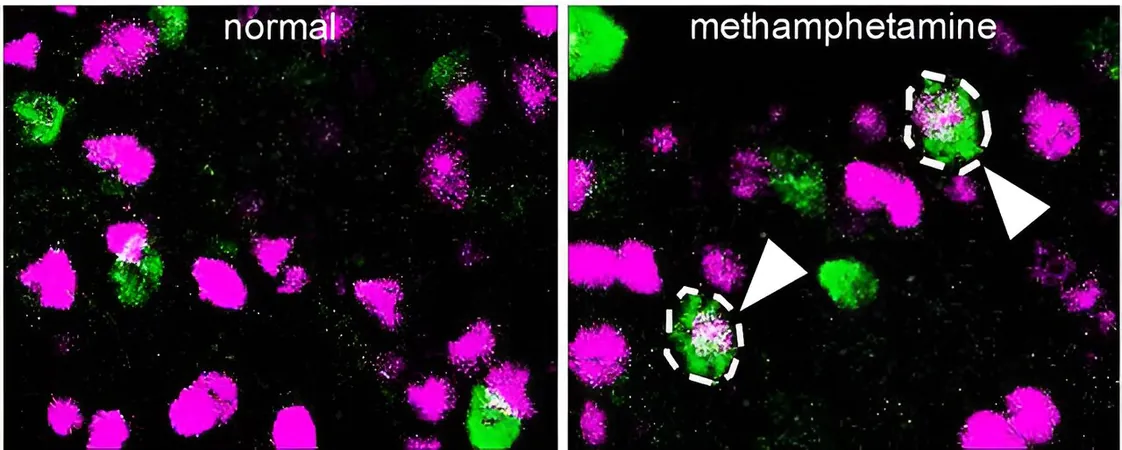
Shocking Discovery: The Hidden Mechanism Behind Cognitive Decline Due to Meth and PCP Exposed!
2024-09-26
Sustained Drug Abuse and Cognitive Impairments
Sustained drug abuse often leaves an indelible mark on the brain, leading to severe cognitive impairments that can linger for years.
Groundbreaking Research from UC San Diego
Now, groundbreaking research from neurobiologists at the University of California San Diego illuminates the chilling mechanism through which substances like methamphetamine and phencyclidine (PCP) inflict cognitive damage.
Study Overview
In a recent study published in Nature Communications, scientists from the Department of Neurobiology explored how these two vastly different drugs, which influence various targets in the brain, strangely result in similar memory impairments. This raises an unsettling question: how can a seemingly divergent action lead to the same cognitive fallout?
Neurotransmitter Switching
The team, led by Assistant Project Scientist Marta Pratelli under the guidance of Professor Nicholas Spitzer, discovered that both meth and PCP trigger a change in neuronal communication via a phenomenon known as neurotransmitter switching. This process is a critical area of research that highlights how the brain's architecture and functioning adapt based on experiences, both negative and positive.
Research Findings
By examining the cerebral cortex of mice, the researchers found that exposure to meth and PCP caused a switch from the brain's primary excitatory neurotransmitter, glutamate, to the inhibitory neurotransmitter, GABA (gamma-aminobutyric acid), particularly in the prelimbic region of the frontal cortex—crucial for executive functions like decision-making and impulse control.
Memory Performance Decline
This neurotransmitter switch correlated with a remarkable decline in memory performance. However, when the researchers blocked GABA expression, the drug-treated mice showed an impressive recovery in task performance, indicating a reversible process.
Disruption of Neurotransmitter Switch
Further astonishment unfolded as the scientists discovered that disruption of this neurotransmitter switch could be accomplished even after extensive drug exposure. By utilizing specific molecular tools or clozapine, an established antipsychotic, they were able to decrease brain electrical activity, effectively reversing the cognitive decline associated with drug intake.
Implications for Addiction Treatment
This discovery suggests that targeted interventions in neuronal activity could help counteract the adverse effects of repeated substance abuse, stated Pratelli, highlighting promising implications for therapeutic approaches in addiction treatment.
Dopamine Release and Common Biological Responses
Moreover, their findings indicated that an increase in dopamine release, a neurotransmitter pivotal for the brain's reward system, paired with heightened electrical neuron activity in the cerebral cortex were preconditions for this neurotransmitter switch to happen, unveiling a shared biological response to different drugs.
Significance of the Study
Professor Spitzer encapsulated the significance of the study, asserting, “We have revealed a common and reversible mechanism that governs cognitive deficits induced by various drugs. This could be a crucial stepping stone toward developing targeted therapies for those struggling with addiction.”
Conclusion and Future Directions
The implications of this research extend far beyond laboratory findings. They can enhance our understanding of addiction's impact on cognitive abilities and inform future treatment strategies focusing on brain plasticity and recovery. As the fight against drug addiction continues to evolve, studies like this illuminate paths to potential healing and resilience in the brain.


 Brasil (PT)
Brasil (PT)
 Canada (EN)
Canada (EN)
 Chile (ES)
Chile (ES)
 España (ES)
España (ES)
 France (FR)
France (FR)
 Hong Kong (EN)
Hong Kong (EN)
 Italia (IT)
Italia (IT)
 日本 (JA)
日本 (JA)
 Magyarország (HU)
Magyarország (HU)
 Norge (NO)
Norge (NO)
 Polska (PL)
Polska (PL)
 Schweiz (DE)
Schweiz (DE)
 Singapore (EN)
Singapore (EN)
 Sverige (SV)
Sverige (SV)
 Suomi (FI)
Suomi (FI)
 Türkiye (TR)
Türkiye (TR)